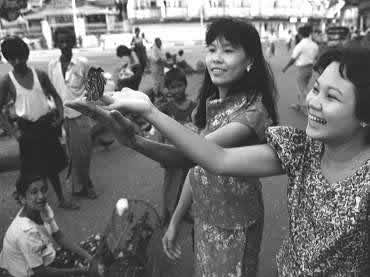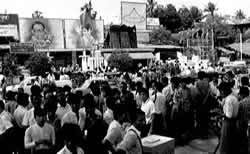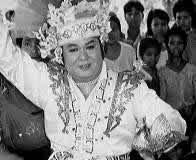Burma(Myanmer) Calm with Suppressed HopeMay 1990
Suffering from poverty, the people pray thata democratic regime will be formed.

“I wish I could fly in the sky like you,” the young woman whisperedto a little bird. Tradition has that if you release a sparrow, wishing on it, your wish will be granted. Now, sparrows are much in request in Burma, where a general election was held at the end of May, 1990.
The vote resulted in the landslide victory of the National League for Democracy (NLD), but the military government hasn’t announced clearly when it will release the political prisoners or when it will devolve the power on NLD. On the contrary it practically has proclaimed martial law: suppressed a meeting of more than five people, imposed a curfew and prohibited criticizing the current government. The citizens are suffering poverty and longing for the dawn of democracy. I focused my camera to those people in Rangoon.
Controlled by the military authorities, the city is very quiet.

to see the NLD report of votes totalized by itself.
“I never thought I could see the victory of NDL in life. Unanlia = a fictitious name, a monk wearing a reddish brown stole, looked toward the quick report of votes counted. He has preached on the street and criticized the government, but still he was never arrested. So he thanks to the Buddha that he could be among the witnesses of this joy without being under arrest.
Around 4 o’clock in the afternoon every day, the NLD headquarters is crowded with the people on their way home from work or shopping. They can’t wait for the announcement by the Central Election Administration
Committee, which usually takes a long time to announce, so they come to see the NLD report of votes totalized by itself. But only the headquarters was in a festive mood. A great silencereigned over Rangoon City because of control by the military authorities. At a rental video shop in an exclusive residential district, I met Ten Min (24) = a fictitious name, a graduate student of the master course in botany of Rangoon University, which has been closed since August, 1988. He put up the shutters quickly when the street was deserted. Min was badly wounded in the side during the military training about seven months after he barricaded himself in a jungle on the Thai border. The medical center in the student camp couldn’t do anything with that wound, so he crossed the border and entered a general hospital in Thailand. But there, he was suspected of government-side spy, so he ran away from the hospital and surrendered to the military last May, realizing that he would be tortured. He said, “They asked me why I had went to the camp, so I answered defiantly ‘because I had seen a soldier shoot my friend dead just in front of me.’ Then they released me soon. They only identified me. When I sensed someone following me, I noticed this was a trick the military played. They intended to make a wholesale arrest of underground student activists by leaving me at large on purpose. I was shadowed about for two months. Even now they sometimes come and ask what I am doing and where.”
The most popular video is a picture of poetic justice,”The Biographies of Eight Dogs.”

He could escape arrest by a hairbreadth on the death day of Aung San, the Founding Father, but about one hundred people were arrested. At present about two thousands of people are placed under arrest for political offence.
On parting, he told me about the most popular video in Myanmar. Surprisingly it was a Japanese video, “The Biographies of Eight Dogs.” The original of this story is the most important work of Bakin Takizawa, a Japanese famous fiction writer in the Edo era. At that time the sale of the book was prohibited because it preached poetic justice under the corrupt Edo regime. According to Min, the leading actor, Shinichi Chiba was called “Sony Chiba” in this country and very popular among the people.
After a 30 minutes’ drive from the capital, Yangon, you can see paddy fields stretching on the both sides of the road as far as the eye could see. “Even if I sell the entire rice crop to the government, I will get barely enough money to live on for a month,” said Maung Cho (62) = a fictitious name. “But I can not do anything but this,” he added and tightened the reins of the cow with a plow. He can reap only one crop a year, because his field becomes a lake in a rainy season. The rationed fertilizer is not enough to increase yields, but he can’t afford to buy the fertilizer in a black market because it is three times as expensive as an official price.
And also, Chi Ruin (33) = a fictitious name, a government-managed factory worker, said with a sigh, “My salary is scarcely enough to support a family of three.” His monthly salary is 750 kyat (one kyat is about three yen at the market rate). He needs at least 1,000 kyat a month, so that he ekes out his income with part-time construction work. He also said that he could buy an amount of rice, oil, sugar, soap and the like sufficient for one person, because he was a government employee, but ironically government-manufactured articles were inferior in quality.Kin Miyan (13) earns 30 kyat a day by peddling pineapples carrying them on her head. She is the oldest of four sisters. She said, “I give all the money to my mom.” I was touched to hear that. The elementary school attendance rate in this country is 56.5% and the graduation rate is only 27%. (Surveyed by UNICEF)
For the souls of people who died violent deaths

In Rangoon, where noticeably many children work to support a family, there is a magnificent planetarium that was built with Japanese voluntary aid, but it opens only on Saturday and Sunday, and today there were only 18 visitors.Maun Win (31) = a fictitious name, who has been an engineer of the planetarium since it opened in 1987, explained. “Everyone is afraid to come because there is nothing but military installations in the neighborhood. A persistent rumor has it that the site was decided to be here by a word from Ne Win, a devotee of astrology. And here is inconvenient to the bus.”
While Western democratic governments were suspending aid to So Maung military regime, the aid-giving giant, Japan, was the first to resume giving aid, but it is doubtful whether the Japanese aid really benefited the Burman citizens. I saw an extraordinary crowd in downtown Rangoon, where shacks with a roof thatched with nipa stand side by side. In front of an altar with offerings of fruit and flowers, people were performing a dedicatory dance in swinging rhythm with the folk musical instruments. It was the festival of Nat Spirits, guardian deities of folks. They deify as Nat Spirits the souls of people who met violent deaths by the state power when Medieval Burma was founded as a Buddhist nation.
It is one year and nine months since the bloody demonstration for democracy was staged. Now that the democrats won a sensational victory in the general election, which had been a long-cherished wish of the people, they must be praying all over again that the souls of those who died violent deaths will repose and a democratic regime will be formed.
